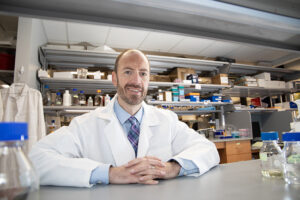Scientific operations director at Masonic Medical Research Institute discusses new lines of research at the institute, which includes autism, Alzheimer’s, PTSD; says 10-year goal is to have a med school on its campus
David L. Podos
 Q: Four years ago, I had the opportunity to interview you. We discussed many topics such as what research you and your colleagues were working on. At that time, you said the institute was focused on the heart and the electrical impulses that allow the heart to beat. So you and your staff were working on research that was primarily cardiovascular. You also mentioned that you have a Ph. D. in inorganic chemistry and hold several titles, those being, associate professor of cardiovascular medicine and scientific operation manager here at the research institute. Has any of that changed?
Q: Four years ago, I had the opportunity to interview you. We discussed many topics such as what research you and your colleagues were working on. At that time, you said the institute was focused on the heart and the electrical impulses that allow the heart to beat. So you and your staff were working on research that was primarily cardiovascular. You also mentioned that you have a Ph. D. in inorganic chemistry and hold several titles, those being, associate professor of cardiovascular medicine and scientific operation manager here at the research institute. Has any of that changed?
A: Yes, there have been some changes not only in my title but in the research that we are doing. In regards to my title, I am now the scientific operations director. Concerning the research that we conduct here; cardiovascular disease was our main focus for the past 60 years, but now we have diversified. We are looking to be really good at three things in particular. So, first and foremost, cardiovascular research is still our “root,” but now we are also focusing our attention toward Alzheimer’s, autism and PTSD. In addition to those three areas, we are also looking into autoimmune disease states such as Lupus.
Q: What was the catalyst that made the change for the institute to go from principally cardiovascular research to these other areas of medical research?
A: Great question. Well, all of the staff here, including me, had it in us [the desire to branch out to other areas of research] before we came to work here. So, good scientists are able to take an idea and follow the path wherever that path takes them. That said, here at the Masonic Medical Research Institute all of us are very democratic in the sense that we all work together, it’s very synergistic. We just literally followed the leads that our research was showing and that led us to open up and become more research diversified.
Q: That is very interesting, can you provide a specific situation where your work or the work of another staff member led to this diversification?
A: Absolutely. Dr. Maria Kontaridis is a molecular biologist and also our executive director. She is very interested in what is called pathways. It’s how a cell gets a signal from the outside to the inside. Her work starts off in pediatric cardiovascular disorders, then goes into autism, following one lead then goes into autoimmunity following a different lead, then to gastric cancers in a third lead. So, that’s how we began to diversify, it is a very organic process.
Q: It is obvious that the work being done here is significant and has the potential to help so many people. Regarding the facility, how does it measure up to other medical research facilities across the country?
A: We are often referred to as a hidden gem. However, on the national stage a great indicator of how well we’re known is by our funding. So, we are a nonprofit and a research center that is mainly funded by grant funding from many sources such as the National Institute of Health as well as foundation funding from the American Heart Association, Lupus and Allied Disease Association and entities like that. We are actually competitive with Stanford and Harvard Medical School in regards to grant competition, which is very impressive. So, our research is well respected. In grant funding the funders look at the recognition of who you are and where you are, so they recognize our value and contribution in the world of medical research.
Q: Is there any collaboration with your facility and the new Wynn Hospital that just recently opened in downtown Utica?
A: Yes, for sure. The hospital is increasing its medical education program and as such they have brought in people from medical education and medical research to work in partnership with us. They are hospital employees that are [at this point] working directly with the research center to create an association between ourselves and the new hospital.
Q: Are there any other local hospitals that you’re currently working with?
A: Yes, we do have a collaboration with Rome Hospital, located in Rome. We receive tissue samples from them so we can study those tissue samples, these are skin tissues that after surgery would normally be disposed of. We receive them to conduct medical research.
Q: What do you see in the future for the research institute?
A: We have big plans going forward. Our 10-year goal is to have a medical school somewhere here on the grounds, more precisely, an integrated medical research campus. We would be able to provide doctors who are in residency programs and other staff an opportunity for them to do their research here at our medical school research campus while they do their clinicals at say, the Wynn Hospital for example. Some of the best medical doctors I have met have their foot in both realms, patient care and research.
For more information about Masonic Medical Research Institute, call 315-624-7484 or visit www.mmri.edu.
